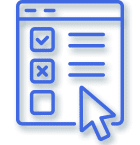What does an Addiction Counselor in Kansas do? What is Their Job Role?
The Kansas state government licenses individuals to perform alcohol and drug abuse counseling. The agency responsible for certification and licensing is the Kansas Behavioral Sciences Regulatory Board. The government of the state of Kansas licenses treatment providers and substance abuse counselors. Substance abuse counseling is an important part of the state’s approach to the treatment of alcohol dependency and illegal drug addiction. The State offers three levels of certification with expanded autonomy and scope of practice for the top levels.
The State has a comprehensive set of substance abuse human services including elements like acute detoxification, intervention, crisis intervention, case management, intensive inpatient treatment, and intensive outpatient treatment.
Compare Popular Online Substance Abuse Counseling Programs
Overview
The Kansas licensing law took effect in 2011. The state made some changes during the course of carrying out the law; one change involved an addition to the licensing categories. The Board added the Licensed Master Addiction Counselor. This credential helps applicants with advanced degrees gain a credential with greater scope and autonomy than the basic LAC.
The LCAC credential is the highest level and has fewer restrictions than the other certifications. The LCAC holders play the essential roles of providing clinical supervision to different tiers of counseling that seek to raise their level and scope. As the demand for addiction counselors grows in response to the need for treatment, the system needs a higher number of LCACs to expand the teaching capacity in Kansas.
Kansas Licensing & Certifications for Associates & Independent Counselors
Some basic qualifications apply to all applicants. Each certified mental health counselor must pass a criminal background check and agree to follow the State's code of ethics for counselors. All required qualifications require proof by transcripts, official records, and signed letters from qualified sources.
(LAC)
The basic credential for substance abuse counselors in Kansas is the Licensed Addiction Counselor LAC certification. LAC’s have some restrictions and limits on their practice rights. LACs must practice within the structure of an approved treatment provider. LAC’s perform important work as the main body of treatment and recovery counselors. They work in many clinical settings and organizations including the criminal justice system.
(LMAC)
The Board created this credential for use by addiction counselors with master’s or other advanced degrees but that do not have full clinical qualifications. The credential adds to the range of service options above the LAC level. It is a significant transition to the LCAC level for those that have the educational attainment but do not yet have the necessary level of experience and supervision hours.
(LCAC)
The LCAC is the highest level of certification in Kansas; it requires an advanced degree in addiction counseling and supervised practice after graduation. The LCAC candidate must complete 24 months of supervised clinical work. The training includes completion of a training plan with approved supervision. The trainer must be an LCAC unless there is no available LCAC. A senior and experienced mental health counselor can substitute for an LCAC to perform supervised clinical work.
Education Requirements
LAC Education Requirements
The LAC certification requires a bachelor’s degree in a field of addictions or a related human behavior field. The rules require three credit hours in each of the below-listed subject areas. Applicants must must hold a bachelor’s degree and pass a LAC specific examination.
- The pharmacology of addiction including the effects of psychoactive chemicals, and drugs used in treatment.
- Addiction theory – An introduction to c models and patterns with emphasis on prevention, treatment, and long-term care.
- Ethical concerns, privacy, and legal issues in substance abuse treatment and prevention.
- Group methods- Group counseling involves important factors like cultural differences and evidence-based strategies for improving treatment outcomes.
- Individual methods- the study of therapy and patient relationships that include crisis management and at-risk individuals.
- Assessing and treating co-occurring disorders involves working with the mental or physical illnesses that sometimes co-exist. Students learn about detecting masked symptoms, assessments screening and managing risks.
- Addiction services advocacy and management studies are essential to effective counseling. Systems connect people with treatment resources, access to addiction services is a major component of counseling.
- Social and cultural competence studies focused on family, community, and impact of addiction. Focus on family groups and social structures and how addiction affects them.
- Research requirements affect candidates that graduated after July 1, 2012, to require a course of study focuses on research and counseling practice. They must perform coursework in design, interpretation, and evaluation of substance abuse research.
LMAC Education Requirements
The LMAC requires a master’s degree in counseling, substance disorders, or a closely related human behavior discipline from an accredited school, college, or university. The LMAC candidate must demonstrate the below-listed qualifications.
- Current credential in good standing in a related counseling field issued by a state or credentialing association or public body.
- Six credit hours of ethics training, and six credit hours of work focused on sexually transmitted diseases. All ethics training within six (6) years of the date of the application.
- Six thousand hours (6000 hours) or three full-time work-years of experience as substance abuse and substance disorder counselor.
- Obtain a passing score on the MAC examination; must be less than four years from the date of application.
- Supervised experience as a drug abuse disorder and addiction counselor. The rule requires three full-time years or 6,000 hours.
- Five hundred (500) hours of education and training in related disorders with at least 250 hours in a face-to-face training setting.
LCAC Education Requirements
The LCAC credential is the highest level for treatment of patients and the functional level for providing clinical supervision to other addiction counselors. Candidates with master’s degrees will also need to complete a total of 4000 hours of work experience. The rules require 1500 hours in direct treatment or assessment activities. Candidates to the doctoral level must complete 2,000 hours of the total, and these doctoral- degree candidates must perform 750 hours in direct human services. The below-listed courses are mandatory.
- Survey of addiction and recovery services
- Advanced counseling methods for individual and groups
- Advanced integration and treatment of co-occurring disorders
- Advanced pharmacology treatment for substance abuse disorders
- Diagnosis and assessment methods
- Ethics and professional responsibility
- Applied Drug and Alcohol abuse research
- Complete a practicum by performing 300 hours of direct client counseling, and the rules require clinical supervision for ten percent of the client counseling.
CACREP Accredited Online Certification

Two types of accreditation are recognized in the United States; institutional and specialized. Institutional accreditation takes the entire institution into account while the specialized focus on professional preparation programs. The Council for Accreditation of Counseling and Related Educational Programs (CACREP) is a specialized accreditation that focuses on master’s and doctoral degree programs in counseling at colleges and universities worldwide. Only already-accredited institutions are eligible for CACREP review. The review for accreditation will center on programs offering graduate degrees in counseling.
Find Your Online Addiction Counseling Program
Choosing a CACREP-accredited program ensures that the program meets the highest of quality standards. Many related specialties are accredited bythe CACREP, including addiction counseling. Accredited addiction counseling programs prepare individuals to work with those affected by addictive behavior and their families. Addictive behaviors include alcohol, drugs, food, gambling, sex, and anything else that negatively affects your personal or work life by creating addiction behaviors.
CACREP-accredited programs will focus on treatment models and the phases of addiction including prevention, recovery, and relapse prevention. These 60-semester credit hour programs will include the application of interventions. When students choose a CACREP-accredited program they can be confident that:
- the program meets or exceeds national standards
- the program will focus on professional counseling rather than psychology oreducation
- the program has an excellent reputation
- CACREP graduates statistically receive higher scores on the National Counselor Examination for Licensure and Certification (NCE).
- the requirements for licensure will be met.
Behavioral Sciences Regulatory Board
The counseling industry in Kansas is regulated by the Behavioral Sciences Regulatory Board (BSRB). The Board offers information regarding state laws pertaining to counseling professionals. Also available is a list of licensees with any disciplinary action they may have earned. The mission of the BSRB is to “protect and serve” BSRB licensee consumers. The Board issues licenses and resolves complaints while formulating standards for practice and regulations of the industry.
Address
700 SW Harrison St
Suite 420
Topeka, KS 66603
Phone
(785) 296-3240
Website Address
Licensure:
- Licensed Professional Counselor (LPC)
- Licensed Clinical Professional Counselor (LCPC)
- Licensed Professional Counselor-Temporary (LPC-T)
Counselor Testing & Examination Process

Kansas uses exams administered by the National Association of Alcohol and Drug Abuse Counselors. The LAC candidates must pass the level II exam. Other applicants must take and pass the Master Addiction Counseling exam to qualify for the LMAC or LCAC credential. The Board can accept other testing deemed to be equivalent in scope and difficulty, such as the International Certification & Reciprocity Consortium substance abuse counselor tests. The Board has wide discretion to install credentials on a temporary basis or while applicants complete some requirements. All applicants must provide three professional references, and official transcripts to support educational attainment. The applicants must pay application and testing fees. You should contact the board for the official applications and schedule of fees.
Clinical Supervision Explained

Clinical supervision is a process for improving professional skills; it is a learning environment of a counselor and mentor aimed at creating a long-term pattern of self-assessment, education, and professional growth. Like mentoring, the more experienced members of the profession take on the role of guiding the development of less experienced members. In Kansas, an LCAC should perform the supervision if available. The rules recognize that there are often shortages of LCAC credentialed advisors. Clinical supervision provides a level of individual learning that is not possible in a classroom setting.
The basic process is one of observation and feedback; the counselor and clinical supervisor must have a comfortable range of communications which both are free to express ideas and points of view. The counselor must learn, but also acquire methods of continuing to develop. Critical thinking is a vital part of clinical supervision, and the counselor must also learn self-assessment to identify weaknesses and areas for improvement.
Renewal and Continuing Education

In Kansas, addiction counselors must renew their licenses every 24 months. During the 24 months of licensure, they must complete 30 hours of continuing education. Each time a licensed clinical addiction counselor LCAC renews their license, they start a new cycle of continuing education, and coursework completed before the expiration cannot count towards the following license cycle.
The rule is that each licensed mental health counselor must perform 30 hours of approved continuing education units. The units must support improvement of the counseling skills, knowledge, and ethics. The education should promote the counseling practice and reinforce its values. Addiction counselors that take continuing education units beyond 30 hours, may not use them in subsequent CEU certification periods.
LMAC and LCAC certifications require six hours of education on the subject of diagnosis and treatment for substance abuse disorders and mental health. These include the SBIRT screen, the four-factor approach of Screening, Brief Interventions, Referral and Treatment. Renewal audits occur when the Board randomly selects members for reviews of continuing education. Audited mental health counselors may petition for coursework or perform coursework in designated categories at an accredited school, college, or university.
Potential Counselor Career Path Options
- Addiction Counselor
- Alcohol and Drug Counselor
- Behavioral Health Specialist
- Certified Addiction Drug and Alcohol Counselor
- Chemical Dependency Counselor
- Mental Health Counselor
- School Counselor
- Substance Abuse Counselor
Associations & Organizations
The Kansas Association of Addiction Professionals
The KAAP is an advocacy organization that represents the addiction counseling profession in Kansas. They advocate for better laws, a greater commitment of resources to treatment and prevention. They offer opportunities for professional development through education and by keeping member apprised of the latest developments in evidence-based treatment and prevention programs. The association promotes communications and networking to build a common cause against drug abuse and alcohol dependency.
Association of Addiction Professionals (NAADAC)
The association develops and administers standardized testing for applicants to the LAC, LCAC, and LMAC certifications. Kansa uses NAADAC testing but also accepts equivalent testing from other jurisdictions.
The IC & RC - International Certification & Reciprocity Consortium
This international body develops and administers testing and issues credentials. They are a major source of reciprocity in which credential issued in Kansas might be used in other jurisdictions. The Kansas Board accepts IC&RC credentials that compare to Kansas certifications.
